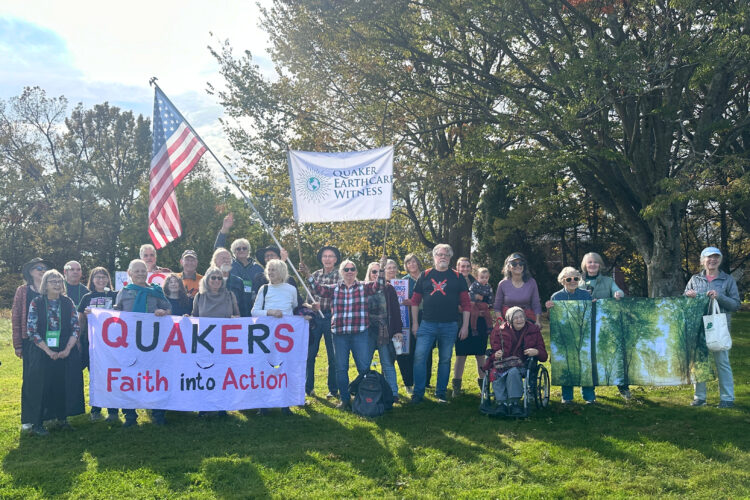Fasting for the Climate: Two Reflections

In November 2013, Typhoon Haiyan devastated the Philippines, killing more than 6,000 people and destroying homes and livelihoods all across the country. Climate commissioner Yeb Saño was at the UN climate talks in Warsaw when the typhoon struck, and his own family was imperiled back at home. He addressed the Warsaw conference in a moving speech, declaring that he would not eat until countries acted to “stop the madness” of the climate crisis. Hundred of thousands have risen in solidarity and Fast for the Climate has become a global movement. The fast continues around the globe, and two QEW Friends participated recently and agreed to share their reflections on the experience.
JIM KESSLER:
I recently spent a Sunday participating in the Fast for the Climate effort as a representative of QEW. I have engaged in the spiritual discipline of fasting at times in the past. I drink tea and diluted fruit juice so that I can focus on the spiritual dimensions of the fast instead of physical hunger. Periodically during the day I paused to reflect and pray for one of the following
topics:
1. for people who are suffering from the impacts of climate change,
2. for plants, animals, and ecosystems that are experiencing the damaging effects of climate disruption,
3. that diverse communities of faith may unite in support of action in behalf of the climate, and
4. that the many actors that impact climate change policy (politicians, citizens across the political spectrum, fossil fuel companies, the scientific community, and environmentalists) may find common ground and support reduction of carbon emissions.
Several of my silences were spent gazing at the incredibly beautiful snow-covered Bur Oak savanna that is visible from our living room. Its visible presence helped me to reflect on why we must press on with efforts to address climate change despite the forces arrayed against climate action. I am overwhelmed when I reflect on the free ecosystem services with which God so freely blesses us through His Creation. Fasting helped me to understand that I must communicate with my family and friends the urgency of climate
action as a moral imperative.
JUDY LUMB:
Saturday, February 7, 2015, was my day in the Fast for the Climate’s rolling fast from the Lima COP20 to the Paris COP21, the meetings of the United Nations Framework Convention on Climate Change. It reminded me of the other time I was involved in a fast as spiritually based political action, one of the most memorable events of my life. It was the “Fast for Life” in 1982 and the issue was the deployment of nuclear warheads in Cruise and Pershing Missiles placed in Germany. The Peace Coalition group in Atlanta chose August 6–9 (Hiroshima and Nagasaki Days) and obtained permission from the Martin Luther King Center to hold a three-day, 24-hour fasting presence at the gravesite. Each evening was Vespers, a silent meeting for worship attended by about 20 supporters from several different denominations, although those of us fasting were all Quakers. During the final Vespers, when we were passing bread to break our fast, Ralph David Abernathy, Martin Luther King, Jr.’s second and his successor, came to pray at the grave. He joined our worshipping group and expressed his appreciation that we chose this place because of the strong connection between peace and civil rights.
This time my fasting day included an indigenous ceremony, which included a Garifuna Mass for their ancestors. I explained about the fast afterward in conversations and the purpose was well understood. It seemed ominous to be holding this for the whole world. I felt like I was holding Earth in my hands. The quote they used from me was, “I think this fast is extremely important because this period of time is make or break for the future of human life on this planet.”

